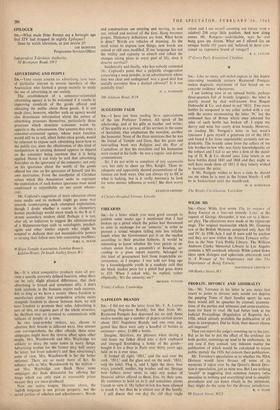31R,--lt is when competitive products must all per- , 'orin a
specific narrowly defined function, when there .:an be only slight physical differences, that their tdvertising is forced and sometimes silly. I don't hink anybody in the business enjoys such excesses. But as long as we have a society where freedom to manufacture similar but competitive articles exists alongside freedom to choose between them, we will have freedom to promote their sales. Advertising is part of this, an organic part of the whole structure, the thriftiest way yet invented to communicate with millions of people at a time.
So two soap-powder makers, say, choose to advertise their brands in different ways. One amuses /our correspondents, the other offends; these same Ampaigns might have the reverse effect upon other people. Mrs, Wandsworth and Mrs. Weybridge are unlikely to share the same tastes in many things. Advertising written for the former may well annoy the latter, but from industry's and thus advertising's point of view, Mrs. Wandsworth is far the better customer. There are so many more of her. So industry sells to Mrs. Wandsworth by the million— Ind Mrs. Weybridge can thank those same .:ampaigns she finds distasteful for offering her hings which can only exist at reasonable prices secause they are mass-produced. Now our native tongue. Heavens above, the inglish language is not private property, not the lacred purlieu of scholars and schoolmasters. Words and constructions are entering and leaving, in and out, retired and revived all the time. Slang becomes proper. Dictionary definitions are bent. What harm is done? Words are vehicles of meaning. As the need arises to express new things, new words are coined or old ones modified. If our language has not the virility and capacity to absorb and reflect the changes taking place in every part of life, does it deserve survival?
Incidentally and finally, why has nobody contested NI r. Copland's point that a palpable exaggeration concerning a soap powder, in an advertisement whose bias was clear and undisguised was a good deal less socially corrosive than a slanted editorial? Is it too painfully true?
D. A. PATERSON

































 Previous page
Previous page